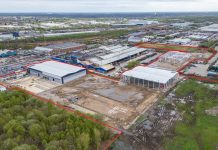The UK logistics market had a record-breaking year in 2018 with annual take-up reaching 35.9 million sq ft, the highest level since 2008.
Research from Cushman & Wakefield has revealed that in the fourth quarter of 2018 take-up reached 11.1 million sq ft, the strongest Q4 on record in over a decade. Whilst 2018 saw fewer deals, take-up was boosted by above-average deal size (191,000 sq ft). E-commerce accounted for 26% of annual take-up with Amazon taking 5.3million sq ft of space in the quarter.
Across the UK take-up reached record or near-record highs in the South East/East (7.4m sq ft), East Midlands (6.9m sq ft), North West (5.7m sq ft), North East (6m sq ft). The largest deal was Amazon’s letting of 1.99m sq ft at Integra 61 in Durham.
Speculative development also saw the lowest void periods since Cushman & Wakefield began tracking it across the UK in 2009, reaching on average nine months for new spec-built space. According to the report, 42 schemes of 50,000 sq ft and above are scheduled to complete this year, totalling 6.9m sq ft – 17% above the five-year average, with more on the starting blocks
Prime rents for larger units rose by 3.3% during 2018, below the five-year annual average of 4.6%, with London registering the highest annual rate of growth (5.7%).
The Investment market remained resilient with volumes in Q4 totalling £1.6 billion, taking annual 2018 turnover to £6.7 billion. Foreign investors remained active, accounting for a third of all purchases across the year, with US buyers, led by Blackstone, being the most acquisitive foreign investor.
Bruno Berretta, UK Logistics & Industrial Research & Insight, Cushman & Wakefield, said: “Precautionary stockpiling ahead of Brexit has been well documented in the media but overall has had limited impact on the market so far, with only a few deals understood to be motivated by the need to hold additional stock in the UK. The coming weeks will reveal if stockpiling is just temporary or could become a permanent feature of the market.
He added: “Assuming a smooth transition after Brexit day, enquiries tracked by Cushman & Wakefield point to a slower start to the year, with an expected rebound on the cards thereafter.”
The report also warns that regardless of the outcome of Brexit, labour availability is likely to become an increasingly critical factor in site selection, with four-fifths (81%) of manufacturing companies recently surveyed by the British Chamber of Commerce struggling to hire the right staff in 2018.
Simon Lloyd, Partner in Cushman & Wakefield’s Logistics & Industrial agency team added: “This report reinforces the underlying strength of the logistics sector, which is fuelled by the growth and changing demands of the e-commerce sector. Greater inventory diversity and reduced delivery times are impacting on logistics networks, generating demand for new warehouses, which is also impacting on the growth of the average warehouse size transacted in 2018. Land shortages in some locations may impact on take-up levels, but there is no current evidence to suggest that the overall market trend will change in the near future.”


















